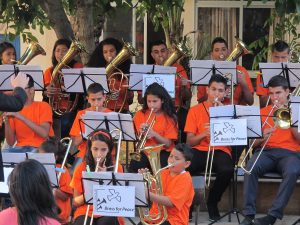The work of Brass for Peace at Lutheran schools in the region of Bethlehem
Brass for Peace has been sending one or two volunteers to the Westbank every year since 2008. They teach students at the three Christian schools Talitha Kumi (Beit Jala), Dar al Kalima (Nethlehem) and the Lutheran School in Beit Sahour how to play a brass wind instrument. Every child that wants to participate may do so. Religion, age and sex don´t play a role. At the moment, approximately 60 students between 7 and 19 years of age are actively involved.

News: From the Bethlehem region
Dona nobis pacem – give us peace! musical prayer
15. March 2022Participants from Palestine, Germany, France, Sumatra (Indonesia) and Sierra Leone sing and play for peace in Ukraine and all crisis regions in the world.







